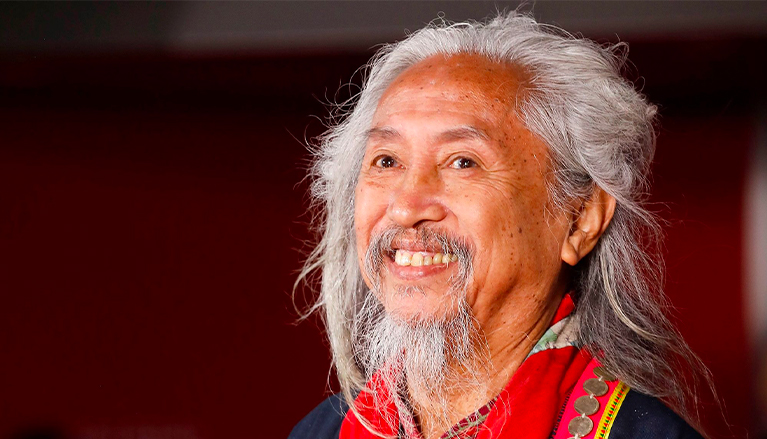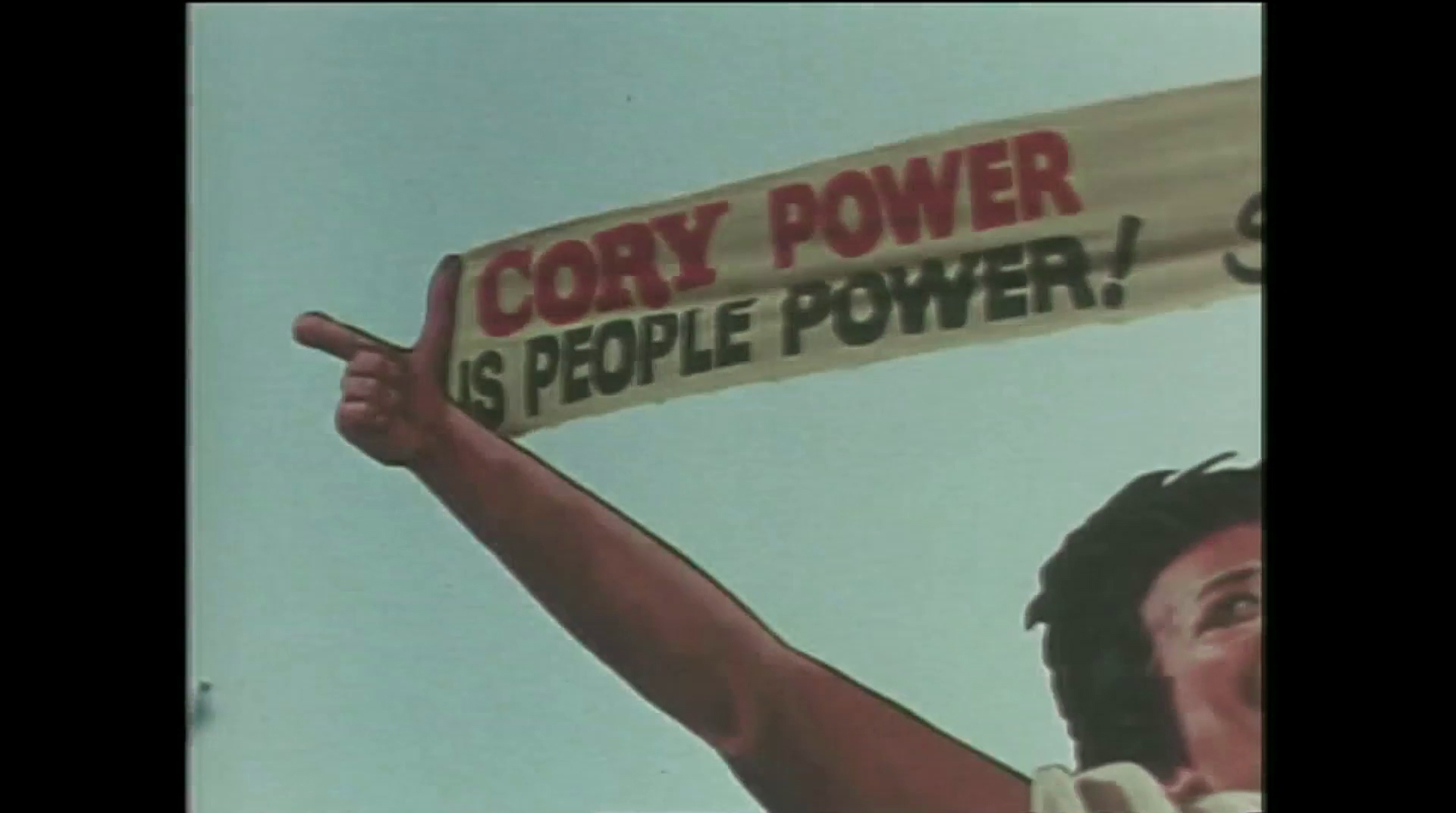LESSONS IN FILM HISTORY #5 - FOR A HISTORY OF POST-COLONIAL CINEMA
A programme by Federico Rossin for the 2022 Pesaro Film Festival
2. Between Cosmology and Ideology
With the presence of Federico Rossin
An epic film diary on the 1980’s challenging all kinds of synthesis for it contains so much. Home movies – holydays, school, children’s first steps – but also an introduction to the history of Philippines and the global processes, i.e., colonialism and neo-colonialism. Incorporating stock footage, newsreels, home movies, travel footage and records of public events and political manifestations, Tahimik constantly subverts the cultural expectations of the first and third worlds’ scenes.

Eric Oteyza de Guia (1942) was born in the Filipino city of Baguio, but he changed his birth name in Kidlat Tahimik, meaning ‘silent lightning’ in Tagalog. After studying economics in the Philippines and the United States, and after working as an economist in France, Tahimik became aware of the capitalist structures that govern production and growth in the post-colonial world. From then on, Tahimik has worked as an actor, performer, writer, and especially film director. His films are open narratives, an ironic blend of film diary, documentary techniques, and cinema essay, including a utopian outlook on life, nature, and identity.
For this fifth episode of the PFF Lessons in Film History – an essay of curatorship between pedagogy and politics, open to dialogue with the viewers – it seemed important to us to question some missing or unknown fragments of a history of world cinema seen from the so-called Third World, looking for new tools of thought and analysis in response to the increasingly decisive and necessary post-colonial and de-colonial theories, stories, and movements with which Italy still struggles to cope.
These three programmes are a first attempt in the direction of an effectively plural writing of the history of world cinema. In the term ‘post-colonial’, the prefix 'post' is not for an 'after,' but for a 'beyond': post-colonial cinema helps us to think about the complexity of the formerly colonized nations without adopting the point of view of us, European colonizers; these films help us get rid of the colonial paradigm and of a uniform and Eurocentric vision of world history. Their heterodox form and hybrid style are an attempt to neutralize the colonial imaginary and deconstruct its categories.
But it is also a question of analyzing the extent to which the dominant history of cinema is also inscribed in the paradigm of colonialism, which is inseparable from Western modernity. If some theorists have raised the question of the "coloniality of knowledge" and the "coloniality of seeing", here we try to pave a possible way for a decolonization of historiographical, theoretical, and critical approaches.
Cinema has been historicized from a fundamentally Western perspective, which has privileged the objects, figures, and movements of the countries central to the capitalist economy and has emphasized certain themes and methods at the expense of everything else. This short retrospective has the theoretical ambition of wanting to focus on another body of discourse, in order to question the critical power of post-colonial approaches in a decentralization of film history and theory, from a non-Eurocentric point of view. The aim is, on the one hand, to re-examine the history of cinema from other geographical areas and different research perspectives and, on the other, to diversify analytical objects, motives, approaches, and methodologies. This aspect is inseparable from a reflection on the persistence and restructuring of colonial relations in Europe today, as well as from the establishment of a more complex genealogy of European cinema that takes into account the counter-history, or missing history, of films made invisible because of their content and their forms, their political, poetic, and formal peculiarity as well as their production methods.
Which films made in (former) colonies or (ex) colonizing nations can be thought as de-colonial gestures as of today? Where does a de-colonial film form begin? In the light of the present and of post-colonial and de-colonial studies, how to revisit films that claimed an aesthetic and political emancipation since the 1960’s? The Pesaro Film Festival has always had an alter-globalist tradition (the proximity to Cinema Novo, Cuban and South American cinema, etc.), and we want to resume here the thread of a long story, while giving it fresh life in the light of our times.
these three programmes explore the cinema of Maghreb feminist directors such as Assia Djebar and Selma Baccar, who have deconstructed both the patriarchy of their societies of origin and Western Orientalism; the cinema of the Colombian Marta Rodríguez and Jorge Silva, who with their work of many years with the Indians of the Andes have managed to decolonize the anthropological discourse by trying new paths of hybridization and mythological storytelling; finally, the heretical-political film diary by Filipino Kidlat Tahimik, who with his homemade D-I-Y approach dismantles third-world rhetoric and neo-capitalist ideology of globalization.
Although the neoconservatives of the past and the present undermine multicultural post-colonialism as a demand for the expulsion and blaming of all European culture from the canon of world civilization, it is actually an attack not on Europe or Europeans, but on Euro-American-centrism (to which we can now also add Putin's Russian neo-imperialism). De-colonial cinema and thought erode the foundations of a culture forged on a single paradigmatic perspective in which the West is seen as the only source of meaning, the center of gravity of the world.
Eurocentrism, which these films question radically, has always divided the world into ‘West’ and ‘rest of the World’, organizing everyday language into binary hierarchies that are implicitly flattering for the Old World: our ‘nations’, their ‘tribes’; our ‘religions’, their ‘superstitions’; our ‘culture’, their ‘folklore’; our ‘art’, their ‘artifacts’; our ‘demonstrations’, their ‘revolts’; our ‘defense’, their ‘terrorism’...
This handful of films has the humility to distract us once and for all from this providential vision of the Old World, and plunge us into a polyrhythmic and polycentric, multifocal, and mixed audiovisual adventure: in search of an aesthetic of resistance at the intersection of magical realism and modernist reflexivity, the rhythm of oral narration and animist spirituality, a polymorphic stylism and a taste for the carnivalesque and the visionary. The facile traditional vs. modern dichotomy and the very concept of cinematic realism - and therefore of reality altogether - are here problematized and made porous and ambiguous. It is precisely this area of apparent insecurity and hazardous ambiguity that we want to explore, in order to open ourselves to a tomorrow without borders and nationalisms, free at last.
Francesco Rossin
Kidlat Tahimik
1984-1994, 16 MM, COLORI, 170', Filippine
SCENEGGIATURA : Kidlat Tahimik, Kidlat Gottlieb Kalayaan
FOTOGRAFIA : Kidlat Tahimik, Roberto Yniguez
SUONO : Ed Deguia (Kidlat Tahimik)
MUSICA : Tumandok, Gerry Baguio, Jessie Soluta, Boy Garrovillo, Tito Martinez, Balatong Gaspalinao, TRibuu 1988, Shant Verdun, Diokno Pasilan
EFX and Liaison: Ping de Ocampo, Romy Bagbagen
DIALOGHI : Kidlat Tahimik, Kidlat Gottlieb Kalayaan, Kawayan Thor Kalayaan, Kabunian Cedric Enrique
ANIMAZIONE E TITOLI : Will Magtibay
MONTAGGIO : Maureen Gosling, Charly Fugunt, Kidlat Tahimik
PRODUZIONE : Third World Projector (Kidlat Tahimik)
ALL SCREENINGS ARE FREE

